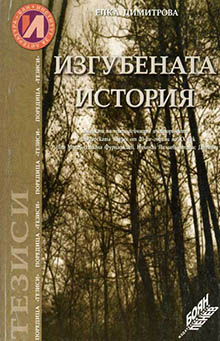Изгубената история
-
Изгубената история
Аспекти на митологичното и историчното в българската поезия от 20-те години на ХХ в. (Гео Милев, Никола Фурнаджиев, Николай Лилиев, Атанас Далчев)
Aвтор: Елка Димитрова
Издателски център “Боян Пенев”, Поредица “Тезиси”
Съдържание
Въведение в теоретичния контекст на изследването / 7
Гео Милев. Българският постсимволистичен модернизъм
между историчното съзнание и мита.
От понятието към езика / 51
Трите поеми: генеалогия на бунта / 95
Митологизмът и историзмът в “Септември” / 115
“Пролетен вятър” на Никола Фурнаджиев между метафората на историята и мита
Контекстът на времето и пътищата на “алогичността” / 169
Сюжетът на гибелта и възкресението / 175
Между метафората и мита. Дискурсивни аспекти / 188
Метофора или номинационен семиозис /188
Метафоричност или изоморфизъм / 204
Моделиране на вината. Паратаксис и сакрализация / 219
Специфични функции на повторителността / 225
Прояви на митологизъм в структурирането на “Пролетен вятър”
(структурирането на “Пролетен вятър” и конструирането на мита / 228
Към един неосъществен разговор.
Отношението Атанас Далчев – Николай Лилиев в контекста на проблематичния диалог в българската литература от 20-те години / 247
Фигурата на несъстоялото се битие в поезията на Лилиев / 287
Предметност и метафоричност в поезията на Далчев / 307
Заключение / 317
Библиография / 325
Summary / 333
The Lost History
Aspects of Mythical and Historical Consciousness in the Bulgarien Poetry of the 1920s
(Geo Milev, Nikola Furnadzhiev, Nikolay Liliev, Atanas Dalchev)
Autor: Elka Dimitrova
Publishing Centre “Boyan Penev”, Sofia, 2001, 335 p.The work studies some emblematic texts of Bulgarian post-symbolist poetry through the relevant modernist antinomy mythical – hirtorical consciousness. A large metatextual backgraund is actualized, too.The co-existece of mythical and historical elements is presented as a result of the nostalgia of modern consciousness for continuity. These two phenomena of consciousness are investigated as a central opposition in European cultural thinking – since the establishing of Christianity as a view of life.Thus the avant-garde movement of the early 20th century is treated against its archetypal Christian background. In this connection some of the essential paradoxes of Christianity are drawn – paradoxes which every sociohistorical crisis actualizes and transforms into existential and ethical ones, into contradictions, concerning thr very reality of human life.The avant-garde movement, as one of the faces of the sociohistorical crisis in Europe in the early 20th century, is marked by the crash of historical thinking. For example: the lost faith in progress, bequeathed by the Enlightenment: a new feelrng for the relation man – God, etc.
The first part of the book present some basic problems of Bulgaian post-symbolist modernity, mainly through Geo Milev’s works – both critical and poetical.
The second part of the book studies Nikola Furnadzhiev’s collection of poems Proleten Vyatar (Spring Wind). It is presented as a cross-area of metaphor and myth.
The third part of the book comments on the traditional antagonism between Atanas Dalchev and Nikolay Liliev (respectively – between post-simbolism and simbolism).

